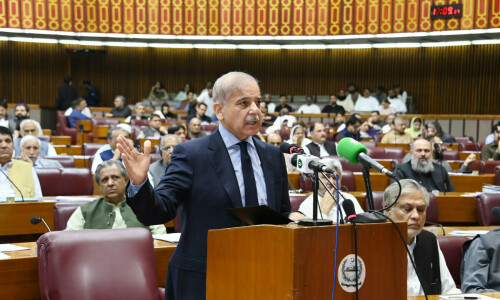• Says Pakistan in talks with China to use local coal in power plants
• Premier set to announce comprehensive economic reform plan today
• Proposals include lowering duties and taxes, cutting red tape, diversifying exports
ISLAMABAD: Prime Minister Shehbaz Sharif on Tuesday expressed concern over Rs500 billion lost each year to electricity theft and stressed the need to reduce power prices to provide relief to both domestic consumers and industries.
He said the government and all its departments are working to provide low-cost electricity to citizens and bring in reforms to achieve economic stability.
Besides, the government is holding discussions with China about using locally sourced coal in the power plants that Beijing-backed companies operate in Pakistan, which are mainly run on more expensive imported coal, the premier said.
Meanwhile, in what appears to be a major reform agenda, PM Shehbaz is set to announce a sweeping economic reform plan on Wednesday (today), which aims to reduce average tariffs on imports to over 14 per cent as part of a government strategy to drive export-led growth.
During a meeting with the newly appointed chairmen and board members of power distribution companies (Discos), PM Shehbaz attributed much of the electricity theft to collusion with Discos’ employees and stressed that reducing theft should be a top priority.
He warned that failure to meet this target would not be tolerated and announced plans to recognise top performers in reducing theft. The premier also pointed out that circular debt has surged to Rs2.3 trillion, a figure representing nearly one-third of the country’s total receipts of Rs9 trillion last year. “Can a country be run with such a heavy burden?” he asked.
To address these issues, the prime minister ordered the immediate implementation of smart metering in some Discos and mentioned ongoing negotiations with China to run power plants using a mix of local and imported coal, which could save the country $1 billion annually.
Reform agenda
The premier’s economic agenda follows recommendations from two high-powered task forces, which he formed to guide the country towards sustainable economic development.
One of these task forces, led by former WTO ambassador Dr Manzoor Ahmed and former National Tariff Commission chairwoman Robina Athar, focused on tariff rationalisation. The other, led by Prof Stefan Dercon of Oxford University, provided insights on economic policy.
Both Dr Ahmed and Prof Dercon were recruited as consultants after PM Shehbaz was impressed by their articles proposing solutions to revive Pakistan’s economy.
Prof Dercon-led committee has already submitted recommendations to the Prime Minister’s Office with three-year targets ranging from exports to economic growth.
Tariff rationalisation
Sources told Dawn that the tariff rationalisation committee has proposed reducing the average tariff on imports from the current 19.5pc to 14.23pc over the next three years. This reduction would apply to customs duty, additional customs duty and regulatory duty. The suggested changes are based on average tariffs in regional countries like India, Bangladesh and Sri Lanka.
The committee noted that lowering tariffs could increase import volumes by 5pc, potentially boosting government revenue.
They also advocated for adopting budgetary proposals from the Tariff Policy Board, which had previously been rejected by the FBR over concerns about decreased duty collection. The International Monetary Fund (IMF) has also supported the idea of lower import duties as part of an import liberalisation strategy.
While the committee recommended reducing sales and withholding taxes on imports, it did not provide specific suggestions in this regard. The committee also recommended lowering duties on several products as part of the green economy.
The projected impact of these tariff adjustments could lead to a $750 million increase in exports during the first year of implementation, with overall exports expected to rise from $32bn to $35bn over three years.
However, these projections are significantly conservative compared to those of Prof Dercon, who estimated that targeted sectoral policies, particularly in commodities and IT, could result in an additional $20bn in exports annually, raising their share of GDP to 15pc by the fiscal year 2027-28.
Grey areas
Prof Dercon’s task force provided a detailed analysis of the economy’s grey areas, identifying barriers to reform and presenting recommendations.
He noted that the success of these reforms hinges on support from the business community, political leadership and the establishment.
The task force recommended reducing bureaucratic red tape and creating a level playing field for businesses to stimulate both domestic and foreign investment. It also advised market-based reforms to ensure secure and affordable energy, which is crucial for export promotion.
Key strategies for export growth include diversifying exports in sectors such as agriculture, IT, and non-traditional industries, as well as integrating into global value chains. The task force also proposed lowering import duties to prevent import substitution.
It also recommended the establishment of a policy unit under the finance minister to evaluate all taxes, energy tariffs, customs duties and subsidies through economic principles. The task force stressed the importance of broadening the tax base by spreading taxes more evenly across businesses and households, including through digitalisation, to reduce the burden on individual taxpayers.
It also advised the state to reduce its footprint by privatising or improving the management of state-owned enterprises.
The committee’s ambitious targets include achieving 6pc or higher GDP growth by FY28. It also projected an additional $10bn in private investment annually, increasing the investment component of GDP to 15pc by FY28. According to the study, public finances are on track with the IMF programme, with the tax-to-GDP ratio expected to reach 13.5pc by FY27. These measures are anticipated to create an additional one million private-sector jobs by FY28.
Later, in a cabinet meeting, PM Shehbaz stressed the need to reduce production costs to revive the industrial and agricultural sectors. He noted that government initiatives, particularly in the power sector, were starting to yield positive results.
He highlighted the need for reforms within the FBR to enhance tax collection and support national development. He shared his vision for revitalising the FBR by cutting red tape, streamlining paperwork and fully digitising the process. He also urged all ministries to go paperless, stressing that success was unattainable innovation.
The cabinet also approved an increase in the number of Privatisation Board members from eight to 11, with the prime minister stipulating that the three new posts be filled by women, in line with his directive to increase female representation on key boards.
The premier also sought a comprehensive privatisation plan for state-owned enterprises, whose denationalisation has already been approved.
The cabinet also regularised all contractual employees of the Federal Board of Education. The meeting endorsed the decisions of the Economic Coordination Committee held on Aug 2 and said all urea factories will get uninterrupted gas supply.
Published in Dawn, August 14th, 2024












































